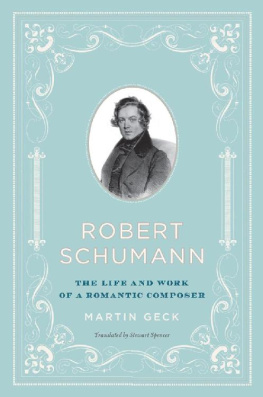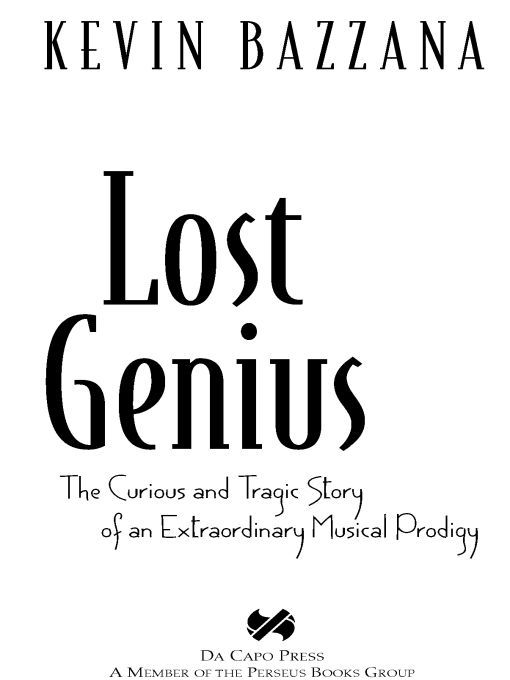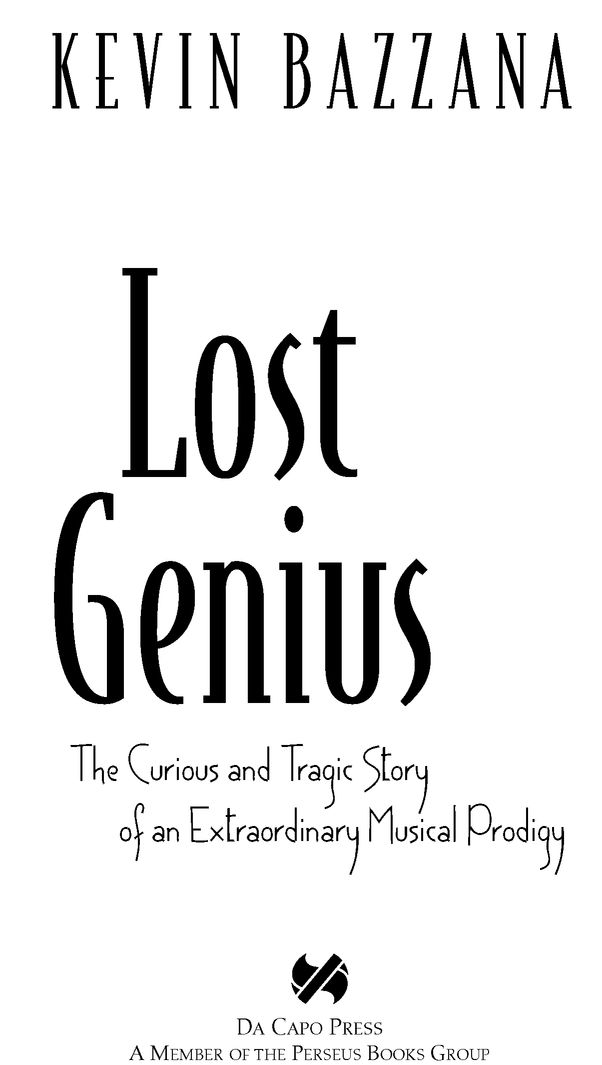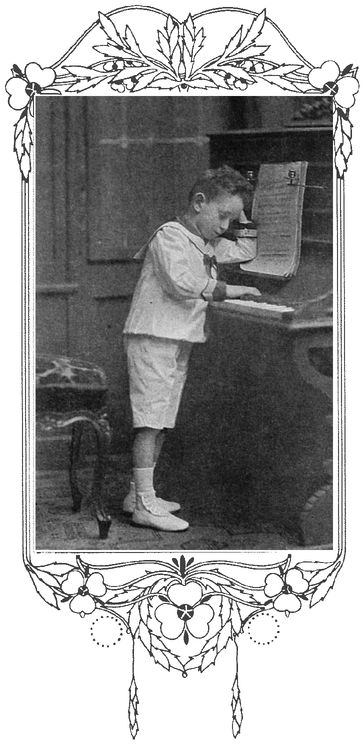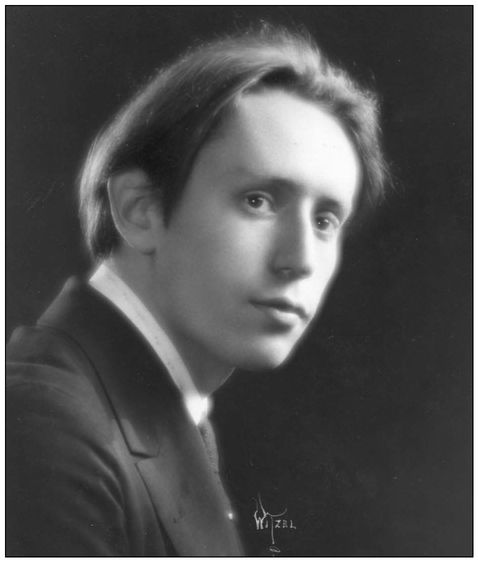Table of Contents
Praise for Lost Genius
Even if your interest in classical music is elementary orshame on youmerely perfunctory, Lost Genius offers much more than the elegance of the Vienna Philharmonic and the fun of the Boston Pops.... Though there will undoubtedly be some bigger biographies published this fall, it is hard to imagine a more delicious one.
MICHAEL DIRDA, Washington Post
An extensively researched, nuanced account of a spectacularly dysfunctional life.BARBARA JEPSON, Wall Street Journal
Extraordinary... Bazzana painstakingly re-creates a life lived mostly in obscurity and judiciously separates greatness from vainglory. The result is a balanced portrait that also often reads like a parable about the artistic temperament.The New Yorker
[Bazzana] fleshes out the details of Nyiregyhzis rise and fall, and rise and fall... he represented the desire for... a collective wish to stem the tide of time and return to an era when classical music mattered more.
MICHAEL KIMMELMAN, New York Times
In a chronicle crowded with colorful charactersa famous novelist, a prize-fighter, unscrupulous managers, divas, whores, and even Count Dracula, Bela Lugosithe most colorful and conflicted figure of all is Nyiregyhzi himself.... Kevin Bazzanas enthralling biography conducts us through his life with compassion, insight, humor, humanity and a proper degree of amazement.
RICHARD DYER, former music critic of the Boston Globe
A page-turner.... There was no modern pianist like him.
MARK SWED, Los Angeles Times
The amazing thing about this story is the inextinguishable nature of this mans genius, which kept flickering to life in recordings and odd performances, even incognito on occasion, long after the mainstream musical world had written him off.The Atlantic
There isnt a superfluous word in the 368-page text.
JOHN TERAUDS, Toronto Star
Nyiregyhzi comes off as a cross between Mozart and Charles Bukowskia person endowed, in equal measure, with enormous gifts and an appalling drive toward self-destructionand this riches-to-rags chronicle of a life that encompassed performances in European palaces and a long residence on skid row in downtown Los Angeles is one of the great musical biographies.
TIM PAGE, Pulitzer-prize winning music critic and biographer
Delights in the strangeness of its subject without making any wild claims for or against him.... What stands out more clearly is the doctrinaire idea that emotion alone can supply the foundation to which Schoenberg alludes in his letter. It is a bleak idea, yet one that acquires a crazy nobility if pushed far enough.
PETER SCHWENDENER, The New Criterion
Passionate, level-headed, scrupulously detailed, affectionate, this is a wonderful biography about an intriguing and difficult figure, handled with supreme delicacy.STEPHEN HOUGH, pianist
Kevin Bazzana loves the piano and is intrigued by the often strange creatures who play the instrument. In this new biography, he has hit the center of a mad genius. It is a tragic story that readers will not put down, and it is written with care and scholarship.
DAVID DUBAL, WQXR broadcaster and author of The Art of the Piano
Kevin Bazzanas Lost Genius pieces together the remarkable and bizarre story of Ervin Nyiregyhzi in a brilliantly researched, sympathetic yet frank and fair-minded biography.... One hopes that this superb and significant biography will generate interest in making Nyiregyhzis best recordings easily accessible.
JED DISTLER, Gramophone
To Sharon, Sophie,
and Blossom - again
Ervin Nyiregyhzi in his mid-twenties. (Photograph by Albert Witzel. University of Southern California, on behalf of the U.S.C. Specialized Libraries and Archival Collections.)
PRELUDE
THE STRANGE CASE OF ERVIN NYIREGYHZI
One Sunday afternoon in Los Angeles, not long after the end of the Second World War, the impresario Irwin Parnes attended an open house at the home of some Hungarian friends. I could hear through the din of conversations someone playing the piano, he recalled in his memoirs. Strangely enough, out of the large gathering, there were only a handful of people listening. I moved closer to the piano growing more excited every minute. The pianist was playing Liszts St. Francis Walking Over the Waves. Never before and never since have I heard this work played so well. The pianist was magnificent. To my mind, not even Horowitz, Hofmann, or Schnabel in their prime could play with more ardor - with more relentless technique than this obscure salon performer. When the work was concluded, I alone shouted bravo and enthusiastically introduced myself to someone whom I considered a very great artist, Ervin Nyiregyhzi.
The pianist, in his early forties, looked destitute, and Parnes felt compassion as well as astonishment. He saw at once a cause he could champion: I would revive him, ballyhoo him. I would force the world to hear and acknowledge his glory. Within a year, his fees would be astronomical. I scrawled my address upon a paper napkin and forced it into his hand. You must not waste your genius on this... My scornful gestures swept our hostess ample home, with its recently lauded acoustics and the now depleted buffet. Come and see me tomorrow and we will plan your next concert. But Nyiregyhzi did not show up. Parnes later learned that he lived in a flophouse on Main Street - to reach him, you had to leave a message at a nearby bar - and was reputed to be quite mad.
Parnes began to collect stories about Nyiregyhzis prodigious musicianship and prodigious eccentricity. He had cancelled a major concert because a bartender had kept him waiting a few minutes that afternoon and, offended, he had decided that he could not play in such a city. He would arrive at a dinner party with a toothbrush in his pocket and leave only when forced to do so. He had married seven times, selecting wives from among his fans backstage, and once walked offstage when he spotted one of his former wives in the audience. These stories were all false, though the truth about Nyiregyhzi was no less strange: he really was that temperamental and unpredictable, and by the end of his life he had been married ten times.
Some months later, early in 1946, after Parnes had stopped trying to track him down, Nyiregyhzi simply showed up at his door, and Parnes was amazed that he was so unlike the typical self-promoting artist. He had not had a real career for more than twenty years and had become (as Parnes had heard) terrified of performing in public; he would give a concert only when starvation loomed. If only there were some way of presenting his art to the public without presenting himself, Nyiregyhzi mused. And so Parnes came up with a radical solution: Nyiregyhzi, billed only as Mr. X, could give a recital while wearing a black silk hangmans hood to disguise his identity. He agreed.





